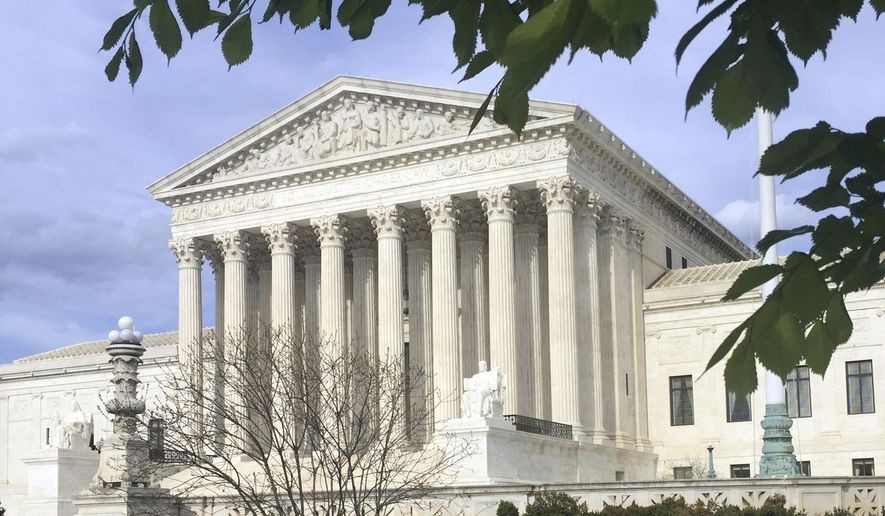A woman who gave birth to triplets as a surrogate mother now wants the Supreme Court to step in and give her some parental rights over the children she carried to term, saying she doesn’t think the biological father can properly care for them.
Melissa Cook is one of several women testing the boundaries of surrogacy contracts and asking judges to weigh in, expanding the rights afforded to women who agree to birth someone else’s child as science widens the paths to family creation.
In her case, Ms. Cook struck a surrogacy deal with a Georgia man in 2015, agreeing to carry children from his sperm and an anonymous egg donor. The man, who is disabled and lives with his parents, agreed to pay her $19,000.
After Ms. Cook found out she was carrying triplets, the man demanded she abort one of them — a process known in the industry as “selective reduction” — for fear he could not care for all three and of harmful side effects to the fetuses if all three were kept to term.
She refused and offered to take care of one of the children, but he rejected that offer.
After a lengthy court battle, Ms. Cook gave birth in a Los Angeles hospital in February 2016, and all three children were turned over to the man in Georgia.
She now says she’s worried about their well-being and wants the court to grant her parental rights so she has say in their upbringing. She refused to take the $19,000 payment and has petitioned the Supreme Court to hear her case, arguing that states should not promote surrogacy.
“When a mother knows that their child is entering into a situation that is not in their best interests or, as in my case, downright detrimental to them, they have a right to object,” Ms. Cook told reporters at a press conference Wednesday.
Surrogacy laws differ from state to state, and there’s no national standard for a surrogate’s rights. Much of it depends on the contract the surrogate reaches with the intended parents.
Ms. Cook argues that no contract should supersede the rights of a woman who carried a child in her womb.
“The mother has a right to a relationship with the child. The child has a reciprocal right,” said Harold Cassidy, Ms. Cook’s lawyer.
She lost in lower federal courts, where judges decided to stay out of the dispute, leaving it to California courts. They ruled the surrogacy contract she signed giving up parental rights was valid.
Arthur Caplan, a bioethics professor at New York University, said it’s unlikely the high court will take her case.
“They’ve tried to stay away from restricting the right to parent, even though we don’t have what would be a positive right to parent,” Mr. Caplan said of the court’s justices.
He said state lawmakers should step in to handle the growing number of unanswered questions about surrogacy, such as whether a surrogate on life support still has to give birth under a contract, and what happens if intended parents die before the birth.
State lawmakers, though, have largely avoided those thorny topics, fearing the consequences of creating another battleground for pro-life and pro-choice advocates.
“The field has gone on as a commercial business with contracts in my view that are set unfairly,” said Mr. Caplan.
Figuring out what situations would create an opening for a surrogate mother to claim rights could be fraught with complications.
One of Mr. Cassidy’s clients, Toni Bare, said she will ask the Supreme Court to step in after the Iowa Supreme Court ruled she had no rights to custody or care of the child she birthed as a surrogate.
Ms. Bare had fought turning over the children after the wife of the biological father used a racial slur to describe her and, Ms. Bare says, harassed her family.
“No state should allow the purchase of a child, regardless of the adults’ desires,” she said. “The state certainly shouldn’t force the sale, or have laws that encourage people to do so.”
Chantele Montover, the wife of the biological father, said she was angry Ms. Bare disappeared and was threatening to abort the children, so she lashed out. Ms. Bare gave birth prematurely, and one of the infants died.
“I’m not a racist person. If I was racist, I would not have chosen an African American woman to carry the most precious thing to me in the world,” Ms. Montover said.
Many European countries have banned surrogacy, spawning what amounts to reproductive tourism, with European couples hiring surrogates in the U.S. in hopes of skirting their home countries’ bans.
Mr. Caplan said bans in some Muslim countries have created another solution: uterine transplants.
“It’s not like these issues are going to go away,” he said. “It shifts the terrain.”
• Alex Swoyer can be reached at aswoyer@washingtontimes.com.




Please read our comment policy before commenting.